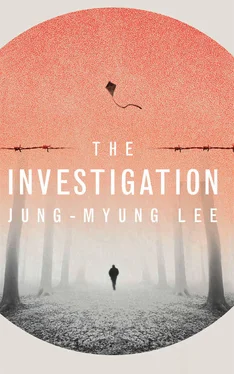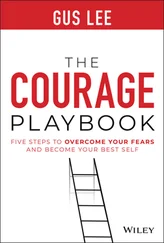The door to the interrogation room opened without a sound and Hiranuma entered. His handsome face glowed in the dim interior. His shaved head and neat eyebrows accentuated his round forehead. He had almond-shaped eyes and a delicate but strong nose. A smile hung from his blistered lips. He looked as though he were dreaming. How could someone like this, with such gentle eyes and a peaceful smile, end up in this place? I checked his file to remind myself of his crime: involvement in the Korean independence movement.
Hiranuma spoke first. ‘I see you, too, were dragged here for no reason.’
Was he proclaiming his innocence? He’d said ‘you, too ’. It didn’t matter. I wasn’t a judge; I was only a lowly guard. ‘Every prisoner says he’s innocent,’ I told him. ‘Even a cold-blooded murderer. But if you’re in prison it means you committed a crime of some sort. Unless you’re Edmond Dantès.’
His eyes gleamed in recognition. ‘What about Prometheus, chained to a rock in the Caucasus?’
I started. We’d read the same books, knew the same authors and shared the same memories. ‘Prometheus stole fire. No matter what you steal or for whom, theft must be punished.’
‘Is it a crime to be powerless and naive? Like Edmond Dantès, who loved Mercédès but couldn’t stop the conspiracy of Mondego, Danglars and Villefort?’ Hiranuma wasn’t really asking a question. He seemed to want to talk about the fictional characters confined in his head, just as I did.
‘To be innocent and powerless isn’t itself a crime, but it could be the cause of a crime. Because nobody can protect someone who won’t first protect himself,’ I said.
He nodded, acknowledging my oblique argument that Koreans were criminals for being unable to hold onto their own country; that being Korean was a crime in itself.
I took out the two pieces of paper from my shirt pocket and spread them on the desk. Self-Portrait. Confession .
Surprise and fear flashed across his face.
‘ Self-Portrait was written on paper torn out of Rilke’s Malte Laurids Brigge . That book was in your box of confiscated documents. This is something you wrote, isn’t it?’ I asked.
‘Yes, the Special Higher Police confiscated that book. But I bought it at a used bookshop. How can you be so sure that I wrote that poem?’
‘Language is a person’s signature, like his fingerprints. It contains his birth and growth, memories and past. Self-Portrait and Confession are twins. If you wrote Self-Portrait , it’s obvious that you wrote Confession too.’
‘Prove it!’
‘This person is used to loneliness. He’s taciturn — he reduces his confession to one line and he wordlessly goes back and forth to the well. He hates and pities himself, but misses himself. He accepts the weight of life. The man who uses his entire body to polish the rusted artefact of a fallen dynasty in Confession is despairing but tenacious. That expression, “a relic of which dynasty?”, refers to his identity. As in: he’s Korean.’
Hiranuma looked at me with an odd expression. After a while he raised his shield. ‘I’m just a prisoner. None of that is proof that I wrote those poems.’
I was waiting for this opportunity. ‘There’s decisive evidence that you wrote Confession . Twenty-four years and one month, that’s how old the poet was when he wrote it. Why would he have written a poem called Confession at such a young age? What would he have to confess?’ I wasn’t looking for an answer; I already knew it. According to the sentencing records, Hiranuma had come to Japan in the spring of 1942 to enrol at Rikkyo University. He had turned twenty-four that past December; he must have written that poem a few months before coming to Japan.
I continued: ‘A Korean needs a certificate to come to Japan legally. You could enter illegally by stowing away on a ship, but not if you were officially enrolling in a university. In order to receive that certificate you are required to have a Japanese name. Your Korean name is the artefact of the fallen dynasty. The “disgraced face” reflected on the rusted bronze mirror refers to your name change. That’s what distressed you. That’s what you were confessing to, as you stared at the person you had to discard in order to come here.’
Hiranuma looked tired. His voice was hoarse when he spoke. ‘It’s just a poem I wrote before coming to Japan. Is that a crime? It’s never even been published.’
‘No, that’s not a crime.’
Then why am I here? his eyes asked.
‘This poem is linked to a murder case. I found Confession in the desk drawer of the guard who was killed three days ago. The same poet wrote Self-Portrait . Now, why did that guard copy down your poem? What do these poems have to do with his death? That’s what I want to find out.’
His eyes were neither guarded nor tense as a smile lingered on his lips.
HOW A BOY BECOMES A SOLDIER
The stove in Maeda’s office was still emitting heat. My blood warmed, making me tired and lethargic. Maeda barely glared at the censor log I handed him before stamping it. I wasn’t sure what to say and what to keep to myself. ‘Regarding Sugiyama’s case,’ I said hoarsely.
‘What about him?’ Maeda asked with a bored expression. ‘Did he rise from the dead?’ He shoved a finger in his ear as though to dig out what I’d just said.
‘I think I’m starting to understand the significance of the poem I found in his uniform.’
He removed some earwax and wiped it off his finger, looking puzzled. I couldn’t blame him; a few anonymous scribbles couldn’t be evidence of anything much, let alone murder. ‘There’s nothing of note about that case. Just focus on your censorship duties.’
‘Yes, sir. I won’t neglect my duties because of the case. If you look at the log you’ll see that I’ve been on the task. But I would still like to investigate the cause of death and the situation surrounding Sugiyama’s murder.’
‘That’s all in the autopsy report the infirmary sent over.’
‘There are certain facts I can’t determine from that document. I think it would be a good idea for me to go to the infirmary and talk to the doctor who performed the autopsy to find out more about—’
Maeda flung aside the newspaper he’d begun to read. ‘You’re in over your head, boy. Do you realize what the infirmary is? It’s solely for Kyushu Imperial University Medical School researchers. It’s a first-tier security zone where guards aren’t even allowed! You can’t just waltz in whenever you want.’
I persisted. ‘I’m conducting the murder investigation according to the warden’s express orders. Something caught my eye on the daily-duties log and that led me to interrogate Prisoner 331. Sugiyama had beaten him so badly that he suffered broken bones.’
Maeda’s wrinkled face showed a glimmer of curiosity. ‘Are you telling me that he killed Sugiyama because of a grudge?’
‘To confirm that I have to interview the doctor who performed the autopsy and take a look at the corpse.’
‘All right. I’ll write you a note. But be careful.’ He stamped a form granting me permission to enter the infirmary. ‘Just do what you need to do and leave. Be invisible!’ Strangely, his order sounded more like a plea.
The infirmary was a two-storey building to the right of the central facilities. From the outside it looked like a single structure, because a long corridor linked the two. Inside, however, it was a different story. The tart smell of disinfectant floated around the infirmary corridor, in stark contrast to the stench of sweat and bodily waste in the central facilities. The clean scent made me faintly dizzy, but it was a small price to pay. The infirmary was built when Fukuoka Prison became a national long-term prison. Before then, nobody gave a second thought to the health of criminals and traitors. So instead of an infirmary, there was a makeshift ward in the administrative wing, without adequate medical equipment and staffed by a doctor pushing sixty and a nurse in her forties. They dealt mostly with corpses fresh from execution, illness and riots. There was no need for medicine, as there was no saving the dying or curing the sick. The situation changed thanks to Professor Morioka of the Kyushu Imperial University Medical School, the country’s foremost medical expert. A charming, sociable man with a deep appreciation for the arts, Morioka was well known in Kyoto as a philanthropist and intellectual. His decision to leave the university for the prison system was therefore a shocking event, and the media covered the move with a tinge of hysteria. Morioka, explaining his decision as a strict adherence to the Hippocratic Oath, said that prisoners, too, had the right to receive medical treatment. As university hospitals were overflowing with good doctors, he would serve those who needed him most. He emphasized that he would continue to conduct research in the prison. The head of the university hospital was flummoxed, and even the mayor tried to persuade him to stay. Morioka recruited a medical staff of ten specialists, a dozen interns, twenty researchers and twenty-odd nurses. When he arrived at the prison, everyone greeted him expectantly. The prisoners were elated that their health, ruined from the cold, starvation and harsh beatings, would now be monitored by Imperial University doctors.
Читать дальше












